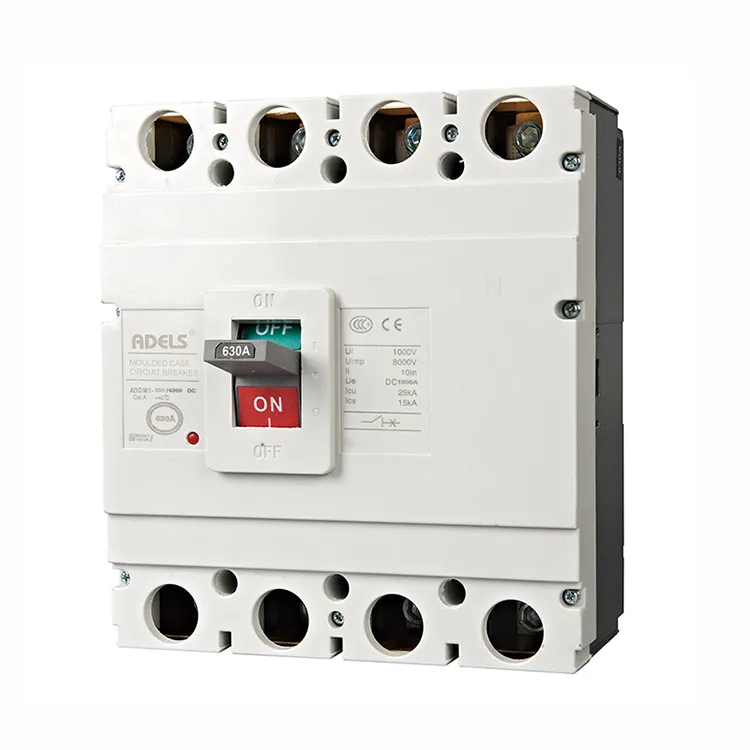Choosing the Right DC Circuit Breaker: Factors to Consider
2024-08-27
With the growing reliance on DC power systems across various industries, selecting the right DC Circuit Breaker is crucial for ensuring safety and reliability. Whether it's for a renewable energy installation, electric vehicle charging station, or industrial application, choosing the right breaker can make all the difference. In this blog, we will discuss the key factors to consider when selecting a DC Circuit Breaker.

Understanding Your Application
The first step in choosing the right DC Circuit Breaker is understanding the specific requirements of your application. Different applications have varying demands for current, voltage, and environmental conditions. Identifying these needs will guide you in selecting a breaker that offers the appropriate protection.
Key Factors to Consider
1. Current Rating: The current rating of a DC Circuit Breaker indicates the maximum current it can handle without tripping. It is essential to choose a breaker with a rating that matches or exceeds the expected load in your circuit. Underrated breakers may trip unnecessarily, while overrated ones may not provide adequate protection.
2. Voltage Rating: DC Circuit Breakers must be rated for the specific voltage of the circuit they will protect. Using a breaker with an insufficient voltage rating can result in inadequate arc suppression, leading to potential hazards.
3. Breaking Capacity: Also known as the interrupting capacity, this rating defines the maximum fault current the breaker can safely interrupt. Ensure the breaker you select can handle the highest possible fault current in your system to prevent damage or failure.
4. Type of Load: Different types of loads (resistive, inductive, or capacitive) have varying effects on circuit breakers. Inductive loads, for example, can generate higher inrush currents. It's essential to choose a breaker that can handle the specific type of load in your application.
5. Environmental Conditions: Consider the environment in which the DC Circuit Breaker will operate. Factors such as temperature, humidity, and exposure to dust or corrosive substances can impact the breaker's performance. Look for breakers designed to withstand the specific environmental conditions of your installation.
6. Compliance and Standards: Ensure the DC Circuit Breaker meets relevant industry standards and regulations, such as those set by IEC (International Electrotechnical Commission) or UL (Underwriters Laboratories). Compliance with these standards guarantees that the breaker has been tested and approved for safety and performance.
Special Features to Look For
1. Arc Fault Detection: Some advanced DC Circuit Breakers come equipped with arc fault detection capabilities, providing an added layer of protection by identifying and interrupting arcs before they can cause damage.
2. Remote Monitoring and Control: In applications where monitoring and control are critical, consider breakers with remote operation capabilities. These allow for real-time monitoring of breaker status and remote tripping, enhancing safety and convenience.
3. Resettable Breakers: Some DC Circuit Breakers can be reset after tripping, reducing downtime and maintenance efforts. This feature is particularly beneficial in applications where continuous operation is critical.
Applications and Use Cases
1. Solar Power Systems: Selecting the right DC Circuit Breaker for solar installations ensures protection against faults and enhances the reliability of energy production. Breakers must be chosen based on the system's current, voltage, and environmental conditions.
2. Battery Storage Systems: With the rise of energy storage solutions, protecting battery systems from overcurrent is essential. DC Circuit Breakers help maintain the safety and efficiency of these systems.
3. Electric Vehicle Infrastructure: Charging stations and EV power management systems require robust protection against faults. Choosing the right DC Circuit Breaker ensures safe and efficient operation of these infrastructures.
Conclusion
Choosing the right DC Circuit Breaker is critical for protecting your DC power systems from faults and ensuring safe, reliable operation. By considering factors such as current and voltage ratings, breaking capacity, environmental conditions, and compliance with industry standards, you can select a breaker that meets the specific needs of your application. As DC power continues to play a vital role in various industries, the importance of choosing the right protection cannot be overstated.


